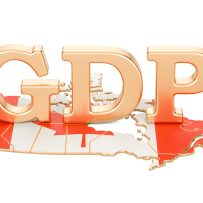‘BOTTOM STILL ISN’T FALLING OUT OF THE ECONOMY’: WHAT ECONOMISTS MAKE OF THE GDP DATA
Posted in
The Canadian economy hung tough in the final quarter of last year, expanding one per cent on annualized basis after contracting in the third quarter, Statistics Canada said on Feb. 29.
Here’s what economists are saying the latest gross domestic product numbers could mean for inflation and interest rates.
‘Sea of red’: Douglas Porter, BMO Economics
Setting aside the increase in exports and consumer consumption, the fourth quarter was mostly “a sea of red,” said Douglas Porter, chief economist at the Bank of Montreal, in a note to clients, in which he pointed out that Statistics Canada recorded contractions in several sectors including housing, business investment, and government spending.
Looking ahead to the first quarter of 2024, Porter said he is taking the Statistics Canada flash estimate for January with “a grain of salt” given the national data agency missed on December.
“On balance, not a bad set of results,” Porter said, though he added that the data reveals “growth is stuttering and sometimes struggling to stay positive.”
The economist doesn’t think these numbers will move the interest rate needle.
“This changes little for the Bank of Canada, as conditions don’t appear to be worsening so there’s no urgency to cut rates,” he said. “With growth still well below potential, disinflationary pressure will continue, but it will require ongoing patience.
‘On the soft side’: Nathan Janzen, RBC Economics
The fourth quarter will likely mark the sixth contraction in a row for GDP on a per-capita basis when fourth-quarter population numbers are released, Royal Bank of Canada assistant chief economist Nathan Janzen said in a note to clients. The quarter also ended on “softer note” with December’s GDP flat, below an early estimate of 0.3 per cent growth.
“Details were on the soft side, with output propped up by stronger external demand as exports rose while domestic demand … continued to soften,” Janzen said following the release of the data.
Quarterly domestic demand contracted for the first time in a year, falling 0.7 per cent annualized.
Janzen doesn’t think there is enough weakness in the report to force the Bank of Canada‘s hand on interest rate cuts.
“The bottom still isn’t falling out of the economy in a way that would push the Bank of Canada to shift quickly to loosen monetary policy,” he said. “But with the economy continuing to show signs of softening, inflation is still likely to drift lower rather than higher…. Our base-case assumption is that the BoC will shift to interest rate cuts in June.”
‘Playing catch-up’: Andrew Grantham, CIBC Economics
Canada’s GDP “rebound” at the end of 2023 was mostly due to the economy “playing catch-up,” said Andrew Grantham, an economist with Canadian Imperial Bank of Commerce.
Easing supply chains bumped up exports, and car sales were the main driver behind the increase in consumer spending in the quarter.
Though the fourth quarter ended on “a weaker note than expected,” the outlook for the first quarter of this year suggests annualized GDP of 1.8 per cent, stronger than the Bank of Canada’s most recent forecast, Grantham said.
“Given that inflation is actually running below the Bank’s January projections, today’s data doesn’t change our forecast for a first interest rate cut in June,” he said.
‘Mixed messages’: Stephen Brown, Capital Economics
The latest GDP numbers turned the Bank of Canada’s forecasts on their head, Stephen Brown, deputy chief North America economist at Capital Economics, said in a note. The central bank had expected the economy to stagnate at the end of the year.
However, “there were mixed messages in the report,” said Brown, noting December’s flat reading.
Statistics Canada is forecasting January GDP to grow by 0.4 per cent month over month.
“Providing the latest preliminary estimate is not also revised down heavily, that means the economy should probably eke out another modest expansion this quarter and reduces the chance of the bank beginning to cut interest rates as soon as April,” he said.
Story by: Financial Post



